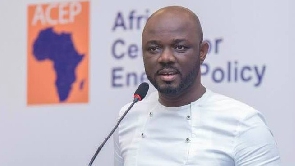The African Centre for Energy Policy (ACEP) has noted that Ghana has incurred a lot of cost over what it describes as political experimentation with the gas commercialization efforts.
ACEP said this in statement while rejecting an endorsement of the Ghana National Gas Company (GNGC) by the Office of the President as the national gas aggregator.
The statement issued on Thursday May 21 said : “It must be noted, that Ghana has paid too much price for political experimentation with the gas commercialization efforts. The original plan after oil discovery was for GNPC to lead the gas commercialization efforts to ensure that the processing of Jubilee gas coincided with first oil.
“After the change of government in 2009, that role was taken away from GNPC to allow the establishment of an independent national gas company. This led to significant delays in the setup of the company, sourcing of financing and the construction of the plant. As a result, processing of jubilee gas could not be possible until November 2014.
“This delay was harshly paid for by the Ghanaian people when gas supply from Nigeria was disrupted in 2012. If GNPC had progressed as planned to bring on the processing plant in 2011, domestic gas would have been available to substitute the shortfall from Nigeria.
“This could have provided relief for the hydro sources of power which was overstretched as a measure to reduce the impact of load shedding until they could no longer operate at their optimal capacity. The consequence of load shedding is documented by ISSER and ACEP to have cost small businesses about $686.4 million annually and about $1 billion losses in revenue to the power sector agencies in 2014- 2015 period.”
The energy think tank further said it has sighted a letter dated May 11, 2020 from the Presidency, endorsing and approving a proposal by the GNGC to assign the role of gas aggregator to the company, with further instructions for the expeditious implementation of the proposal by the Minister of Energy.
The original proposal, according to ACEP is contained in another letter dated May 5, 2020 to the Minister of Energy with the following in copy; Minister of Finance, the Executive Secretary to the President, Board Chair of GNGC, CEO of Ghana National Petroleum Corporation (GNPC), Director General of State Interest and Governance Authority (SIGA), the Deputy Ministers and Chief Director of the Ministry of Energy.
It however rejected this move and further suggested to the government to rather make GNGC a subsidiary of GNPC as a response to the implementation of the Gas Master Plan.
“The Gas Master Plan recommended that GNGC becomes a subsidiary of GNPC, with GNPC performing the role of a gas aggregator. According to the master plan “The decision to appoint GNPC as the aggregator of gas and making GNGC a fully owned subsidiary of GNPC will improve coordination in the sector and facilitate infrastructure investment and financing.”
“This in addition to the security requirement by the OCTP partners informed government’s decision in 2015 to make GNGC a subsidiary of GNPC which was subsequently implemented in July 2016. Unfortunately, the merger only lasted for five months and abandoned after a change of government.
“The proposal to make GNGC the gas aggregator is therefore not in line with the country’s Gas Master Plan which is a product of institutional and stakeholder consultation with support from USAID. This should not be altered at the wish of one party in the value chain. Abandoning the Gas Master Plan deflates the confidence of Development Partners in financing future policy development.
“Transferring the role of an aggregator to GNGC also introduces significant risks for upstream investment and the power sector. The weak balance sheet of GNGC makes it unattractive to the investor community which has implication for exploration and production. The coincidence of the policy change with the challenging global oil industry on the back of COVID19 further exposes the country to high investment risks,” the statement said.
Click to view details



Business News of Friday, 22 May 2020
Source: laudbusiness.com

















